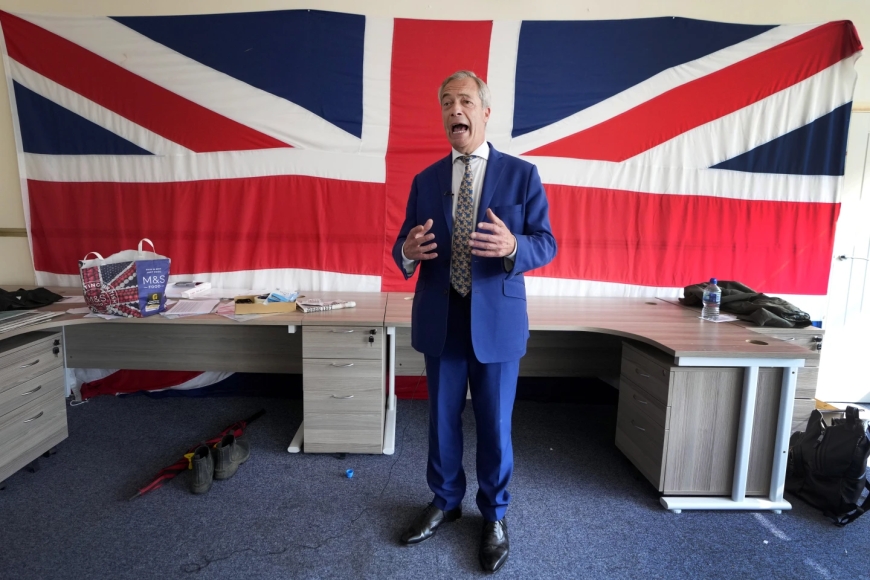Fed Up with UK Conservatives, Some Voters Turn to Anti-Immigration Reform Party for Answers

Dorothy Carr is frustrated with the way things are managed in her hometown. The state-run healthcare system makes it nearly impossible to get a doctor’s appointment, local buses have been canceled, and there is a shortage of public housing. Like many older, white voters in Clacton-on-Sea—a town on England’s southeast coast—Carr has lost faith in the governing Conservative Party. Instead, she plans to vote for the populist Reform UK party in next week’s national election, drawn by its anti-immigration stance.
As Britain heads to the polls to elect a new House of Commons, public dissatisfaction is high due to issues like the high cost of living, a stagnating economy, a dysfunctional healthcare system, and deteriorating infrastructure. This discontent has given the opposition Labour Party a significant lead in the polls and has also fueled the rise of Reform UK and its leader Nigel Farage, who pledges to “take our country back.”
Opponents accuse Farage of inciting racist attitudes towards migrants and argue that the real problem is the chronic underfunding of schools, hospitals, and housing by successive governments. However, many in Clacton, which recorded one of the highest votes to leave the EU during the 2016 Brexit referendum, resonate with Farage’s message. Brexit promised more control over borders, yet immigration figures have continued to rise.
Farage, one of the chief architects of Brexit and often described as Britain’s most divisive politician, is running for Parliament in Clacton, where polls show he has a comfortable lead. “We’re getting poorer. Our productivity is going down. Our public services are failing. Britain is broken and the population explosion is the main reason why,” Farage told The Associated Press in an interview at his campaign office in Clacton on Friday.
He has dubbed this “the immigration election.” The latest official figures show that net migration in 2023 was 685,000, down slightly from a record set in 2022, but still significantly higher than pre-pandemic levels. The Migration Observatory at Oxford University notes that the UK’s foreign-born population stood at about 14% in 2022, similar to other high-income countries like the United States and France.
“Nigel Farage is trying to weaponize the issue of immigration in quite a simple way,” said Anand Menon, director of the UK In a Changing Europe think tank at King’s College London. While high levels of immigration can add pressure to housing, Menon argues that migrants bring significant economic benefits to key sectors, including academia, technology, and health and social care.
Despite the economic arguments, the immigration debate in Britain often focuses on the more emotive issue of people crossing the English Channel in small boats, many fleeing war, famine, and human rights abuses. Last year, about 30,000 people sought asylum this way. Reform UK wants to leave the European Convention on Human Rights to facilitate deportations without legal challenges and to freeze “nonessential immigration” to protect “British culture and values.”
While Reform UK is unlikely to win many seats in Parliament, its message resonates with some voters. Retired couple Sean and Janet Clancy, lifelong Conservative voters, now support Farage. “I think it was a good move for Nigel Farage to come along. It’s really shocked the other two parties, hasn’t it? We’re all for it, really,” Janet Clancy said.
Polls indicate immigration is a critical issue for about two in five British voters, particularly older, male Conservative voters who supported Brexit. Keiran Pedley, director of politics at Ipsos UK, noted that these voters no longer trust the Conservatives’ record on immigration and are switching to Reform.
Prime Minister Rishi Sunak, wary of Farage’s growing influence, has made cutting immigration and stopping asylum-seekers arriving in small boats key pledges. While authorities have tightened rules for international students and workers, Sunak’s controversial plan to send some migrants to Rwanda as a deterrent faces legal challenges.
Critics argue that the Conservatives have shifted their policies to the right in response to Reform. During a recent TV debate, Scottish National Party leader Stephen Flynn criticized both the Conservatives and Labour for engaging in a “race to the bottom on migration.”
Natasha Osben, the Green Party candidate in Clacton, disputes the narrative that migrants are to blame for local issues. “People here are particularly angry because we’ve been left behind by the mainstream parties,” she said. “Rather than admitting their failures, they’ve been happy to scapegoat migration.”
Osben acknowledged Farage’s appeal to frustrated voters but warned that he is not the solution. “He’s come to a place where people are disillusioned, really disenfranchised, and they see him as the answer. But he’s not the answer.”













































